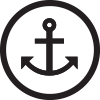
PRE-SEA SAILING COURSE
DURATION: 6 MONTHS
COURSE OVERVIEW
This programme has been designed for those who have an interest in sailing. No prior experience or knowledge is required.
There are 4 parts to this programme:
PART 1: PRE-SEA
Learners start their pre-sea journey with physical fitness and mental health activities. Selected unit standards from the Shipping Practice Programme, will be completed as part of your classroom time focusing on Teamwork, Communication and Mathematical Skills.
As an added advantage, Maritime Geography and Ships Design are also added, to further deepen and widen your scope of employment.
Note: Assessments are written for the selected units, and you will receive a Statement of Results. Should you wish to complete the full programme, these credits will be carried over.
PART 2: COMPETENT CREW: DECKHAND & DAY SKIPPER
Deck Hand includes practical training such as basic seamanship, rope-work, sail handling, keeping a good lookout and assisting with all day-to-day handling of a yacht.
This programme will assist the learner to demonstrate knowledge and understanding of performing bridge watch keeping duties, cargo handling and stowing, assisting with shipboard operations and care for persons, assisting with maintenance and repairs, mooring, towing, berthing, and anchoring and security duties as well as collision regulations, IALA buoyage system, day shapes, sound signals and ships lights, introduction to navigation.
You will learn how to steer a yacht, put up the sails and handle them, become familiar with nautical terms, and learn how to live on a yacht, among other things.
In sailing, safety is of utmost importance, which is why you will also learn how to assist in the recovery of a sailor overboard, operate flares and use life jackets, harnesses, and life rafts. Further topics of interest include basic diesel engine checks and fault finding, basic diesel engine service, servicing of winches, polishing stainless steel, advanced knots, rope splicing.
Once you have successfully been through the competent crew programme, you will sail over 100 nautical miles, enjoy at least 4-night hours of sailing, and visit the harbours and anchorages of the Durban and Richards Bay areas.
The training you receive will ensure that you can function as a confident and competent member of any sailing crew.
PART 3: STCW - SAFETY AT SEA TRAINING
STCW stands for “Standards of Training, Certification, and Watchkeeping for Seafarers”.
STCW Basic Safety Training course is the legal minimum requirement for anyone looking for commercial work aboard vessels, including working on Superyachts and working on Cruise ships.
If you are planning to work on a Superyacht, it is required that you complete the STCW 10 course. The STCW 10 modules are valid for a period of 5 years.
For offshore work, such as working on oil rigs, you will need to complete the STCW 10 course.
PART 4: SRC/VHF RADIO LICENSE
A radio is a highly important piece of safety equipment on board, which is why it is vital to understand the correct usage procedures. Unnecessary transmissions could block out a Mayday distress call.
The Marine Radio Short Range Certificate is a one-day course that caters for anyone who owns or operates a fixed/ handheld-marine VHF radio. Furthermore, this certificate is required by law if you operate a VHF radio fitted with Digital Selective Calling (DSC).
You will also be required to obtain your Short-Range Certificate (SRC) radio course to fulfil the requirements for the Skipper’s ticket.
The radio course can be done before or after attending the Competent Crew: Day Skipper programme, however, we do recommend that you complete the SRC radio course sooner rather than later, as this is a prerequisite to South African Sailing (SA Sailing) issuing your Skipper’s ticket.
Course topics include:
- The basic of radio operation.
- The correct frequencies (channels) to be used.
- Distress, emergency, and medical assistance procedures
- Making ship to shore telephone calls.
- Digital Service Calling (DSC) using simulators.
- Global Maritime Distress and Safety System (GMDSS)
- Emergency Position including Radio Beacons (EPIRB)
- Search and Rescue (SART)
- The course is taught by using radio simulators and will be examined by a written test and practical assessment. All new VHF sets are either fitted or can be interfaced with GPS to allow your position to be sent as part of a Distress Alert.
STCW REQUIREMENTS:
- Must be 16 years of age or older.
- Medically fit (no disabilities)
- Must have the ability to remain afloat with no aids in deep water for 60 seconds.
- Medical Fitness Certificate
- Note: Learners will have to step off a 3m platform into the water, wearing a life jacket (STCW requirement)
CERTIFICATION CRITERIA:
Competence must be demonstrated for each part of the programme, including Pre-sea:
- Competent Crew and Day Skipper will be certificated on full completion of the programme by SAS (South African Sailing).
- STCW will be certified upon full completion of the programme by SAMSA (South African Maritime Safety Authority).
- SRC/VHF must be completed ahead of certification for Day Skipper. SRC/VHF are certified by SAMSA (South African Maritime Safety Authority).
- Statement of Results for the selected unit standards will be awarded by SA Maritime School.
COURSE COMMENCES:
Intake 1: Feb 2025 – July 2025
Intake 2: July 2025 – December 2025
CONTACT US FOR MORE INFO
DBN: 031 337 7889
CT: 021 447 4445
WHATSAPP: 066 503 9946
EMAIL: info@samaritime.co.za
DURBAN: 6 Timeball Boulevard, Signal Road, The Point
CAPETOWN: 31 Victoria Rd, Woodstock
